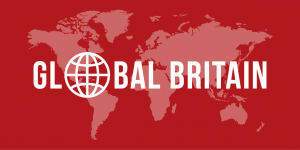Media Release
Tuesday 20th November (embargoed until 10.00am)
The European Research Group (ERG) and Global Britain are today publishing:
Fact – NOT Friction: Exploding the myths of leaving the Customs Union.
Theresa May’s EU proposal will keep the UK in the EU Customs Union because UK negotiators feared that any new customs procedures would impose costs, cause delays, disrupt supply chains and undermine economic growth.
This paper exposes as baseless 17 Myths that underlie the fears and scare stories about leaving the EU Customs Union whether for a Canada style free trade agreement or under World Trade Organisation terms.
The launch event will take place today at 10.00 am in the Upper Room, Emmanuel Centre, 9-23 Marsham Street, Westminster SW1P 3DW.
Panellists include:
- Lord Lilley, Trade and Industry Secretary under Thatcher and Major
- Jacob Rees-Mogg MP (in the Chair)
- Rt Hon David Davis MP, former Secretary of State for DExEU
- Sir David Ord, Managing Director of Bristol Port
- John Mills, co-founder of Labour Leave and CEO of JLM who import and export to 85 countries
- Hans Maessen, Dutch customs and logistics expert
- Simon Boyd, Managing Director of Reid Steel
Some examples from the paper:
FEAR 1: “Customs paperwork” will have to be “checked at the border” after Brexit, causing delays at ports, queues, congestion on motorways and disruption to supply chains.
Fact – NOT Friction:
“All customs declarations are made electronically ahead of arrival at a port; most consignments are cleared within seconds of arrival; a tiny percentage are physically checked as a result of risk assessment by HMRC computers or intelligence information; and such checks may be carried out away from the border at importer’s premises or warehouses… most checks relate to dutiable goods, drugs or illegal immigrants and are made on the basis of risk or intelligence information. HMRC do not expect any of these risks to increase or new risks to emerge as a result of Brexit” and HMRC “will prioritise flow over compliance”.
“Deliberate delays [at Calais] would breach three treaty commitments (the original WTO treaty, the Trade Facilitation Agreement and the Lisbon Treaty requiring the EU to behave in a neighbourly fashion towards adjacent states). Of course, legal redress would take time but ports in Belgium and Holland are eager to take trade away from Calais.”
FEAR 2: There are no border procedures or checks on trade with the EU at present so any post-Brexit deal will increase trading friction.
Fact – NOT Friction:
“Companies have to report their transactions with EU countries separately in their VAT returns; pay duty on tobacco and alcohol (which yield far more revenue than tariffs would in the event of ‘no deal’); they may be searched for illegal drugs or immigrants; drivers must show their passports; and companies of any size must submit details of their intra-EU trade to Intrastat. All but the latter (which will be replaced by customs declarations) will continue post Brexit and constitute the major element of border compliance.”
FEAR 3: WTO rules require checks to be made at the border.
Fact – NOT Friction:
“Checks of customs declarations are carried out electronically and physical checks often made at importer’s or exporter’s premises. Even the Union Customs code, which requires agri-food checks at border inspection posts ‘in the vicinity of the border’ allows them to be as far as 40 kms inland.”
FEAR 4: Just-in-Time supply chains only operate exclusively within the EU.
Fact – NOT Friction:
“A fifth of components imported by UK motor manufacturers come from outside the EU, and their timely arrival is just as essential to the reliable operation of assembly lines. They are subject to customs procedures that do not cause the problems supposed to be likely when applied to future imports from the EU.”
FEAR 5: Free trade agreements impose far more burdens on trade than customs unions do.
Fact – NOT Friction:
“Free trade areas – e.g. NAFTA – are more ‘trade creating’ than the EU customs union. Businesses in Switzerland, Norway and other EEA countries are not complaining about completing customs declarations let alone calling to convert their free trade arrangements into a customs union. This may be because they welcome the free trade agreements their countries have been able to negotiate which would not be possible within a customs union. The Swiss have FTAs with countries whose combined GDP is three times that of the FTAs negotiated by the EU.”
Quotes for use:
Lord Lilley, Trade Secretary under Margaret Thatcher and John Major, said:
“The proposed EU agreement is the result of defeatist negotiating stemming from a complete lack of understanding about how international trade actually works.
“Fact – NOT Friction aims to broaden our understanding of existing customs procedures and to outline the reality of how the United Kingdom operating under World Trade Organisation rules will prosper outside the customs union.
“We should reject Theresa May’s constitutional monstrosity of a proposal, revive Tusk’s offer of a Canada-style free trade deal extended to the whole UK, which may become easier to negotiate once we have left and begun trading on World Trade Organisation terms EU as with non-EU countries after we leave the EU.
“I spent ten days incarcerated in the Heysel Stadium negotiating the Uruguay Round, which set up the WTO. Its rules provide the safety net our businesses and consumers need in exactly this sort of situation. It will ensure that the EU will have to trade with the UK on exactly the same terms as it offers its other major trading partners.”
NOTES TO EDITORS:
For more information, please contact Ed Barker on 07763 719 253 or [email protected].

